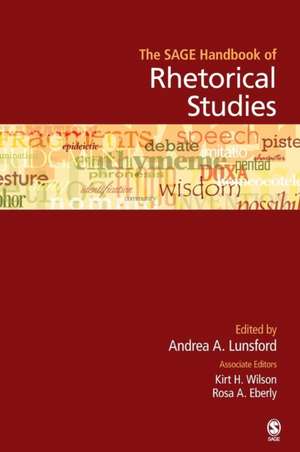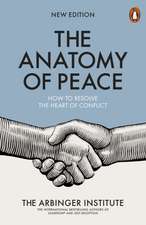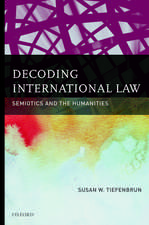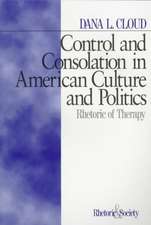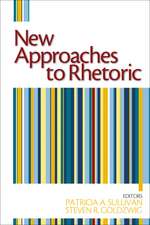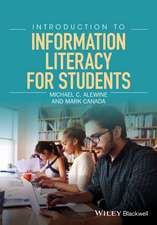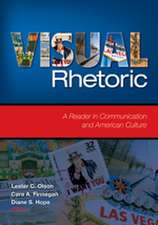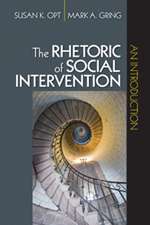The SAGE Handbook of Rhetorical Studies
Editat de Andrea A. Lunsford, Kirt H. Wilson, Rosa A. Eberlyen Limba Engleză Hardback – 16 dec 2008
History;
Theory/Concepts;
Pedagogy;
Dimensions of Rhetoric Practice;
Analysis of Criticism;
New Directions.
Preț: 1096.36 lei
Preț vechi: 1501.86 lei
-27% Nou
Puncte Express: 1645
Preț estimativ în valută:
209.79€ • 219.59$ • 174.61£
209.79€ • 219.59$ • 174.61£
Carte tipărită la comandă
Livrare economică 31 martie-14 aprilie
Preluare comenzi: 021 569.72.76
Specificații
ISBN-13: 9781412909501
ISBN-10: 1412909503
Pagini: 712
Dimensiuni: 178 x 254 x 43 mm
Greutate: 1.36 kg
Ediția:1
Editura: SAGE Publications
Colecția Sage Publications, Inc
Locul publicării:Thousand Oaks, United States
ISBN-10: 1412909503
Pagini: 712
Dimensiuni: 178 x 254 x 43 mm
Greutate: 1.36 kg
Ediția:1
Editura: SAGE Publications
Colecția Sage Publications, Inc
Locul publicării:Thousand Oaks, United States
Recenzii
"Imagine four separate critical anthologies, all excellent and useful, each devoted to a specialized subject area within a broad disciplinary topic, and each containing a useful survey of the subject's historical context and intellectual pedigree and a brief introduction to the ensuing articles that demonstrate the current thinking within the field from a variety of useful perspectives. Combine these hypothetical titles into a single volume, add a statement of scope and purpose that combines personal history with an excellent survey of the intellectual and academic milieu out of which the specialized subjects arose, and one has the present title. Lunsford (Stanford), Wilson (Univ. of Minnesota, Twin Cities), and Eberly (Pennsylvania State Univ., University Park) offer 32 chapters in four divisions: "Historical Studies in Rhetoric," "Rhetoric across the Disciplines," "Rhetoric and Pedagogy," and "Rhetoric and Public Discourse." The many contributors remind the reader that rhetoric today is an ever-expanding, inclusive subject best characterized as an interdisciplinary creature ranging freely across (and even beyond) the fields of English, composition and writing, and communications. In its theory and applied practice, rhetoric has become something greater than the Greeks imagined, something better identified as meta-rhetoric, unlimited by its current conception and reevaluation of what "rhetorical" means. Summing Up: Highly recommended. Upper-division undergraduates through faculty."
Cuprins
PART I. HISTORICAL STUDIES IN RHETORIC
Introduction: Historical and Comparative Rhetorical Studies: Revisionist Methods and Directions - C. Jan Swearingen and Edward Schiappa
1. Historiography and the Study of Rhetoric - Arthur E. Walzer and David Beard
2. Rhetorical Archaeology: Established Resources, Methodological Tools, and Basic Research Methods - Richard Leo Enos
3. Medieval and Renaissance Rhetorical Studies of Women - Christine Mason Sutherland
4. Recovering, Revisioning, and Regendering the History of 18th- and 19th-Century Rhetorical Theory and Practice - Lynee Lewis Gaillet and Elizabeth Tasker
5. Coping With Modernity: Strategies of 20th-Century Rhetorical Theory - James Arnt Aune
6. The Study of Argumentation - Frans H. van Eemeren
7. Rhetoric of Religion: A Map of the Territory - Margaret D. Zulick
8. Feminist Perspectives on the History of Rhetoric - Kate Ronald
9. Recent Advances in Comparative Rhetoric - Sue Hum and Arabella Lyon
PART II. RHETORIC ACROSS THE DISCIPLINES
Introduction: Rhetoric, Disciplinarity, and Fields of Knowledge - John Lyne and Carolyn R. Miller
10. The Rhetoric of the Natural Sciences - Jeanne Fahnestock
11. The Rhetoric of Economics - Edward M. Clift
12. Rhetoric in Literary Criticism and Theory - Don Bialostosky
13. Rhetoric of Health and Medicine - Judy Z. Segal
14. Rhetoric and International Relations: More Than 'Cheap Talk' - Gordon R. Mitchell
15. The Rhetoric of Interdisciplinarity: Boundary Work in the Construction of New Knowledge - Julie Thompson Klein
PART III. RHETORIC AND PEDAGOGY
Introduction: Rhetoric as Pedagogy - Cheryl Glenn and Martin Carcasson
16. Rhetoric and (?) Composition - Bruce Horner and Min-Zhan Lu
17. Intercollegiate Debate and Speech Communication: Historical Developments and Issues for the Future - Jarrod Atchison and Ed Panetta
18. The Consequences of Rhetoric and Literacy: Power, Persuasion, and Pedagogical Implications - Morris Young and Connie Kendall
19. Echoes frmo the Past: Learning How to Listen, Again - Joyce Irene Middleton
20. Civic Participation and the Undergraduate Curriculum - Wendy B. Sharer
21. Visual Rhetoric and/as Critical Pedagogy - Brian L. Ott and Greg Dickinson
22. A Century After the Divorce: Challenges To a Rapprochement Between Speech Communication and English - Roxanne Mountford
PART IV. RHETORIC AND PUBLIC DISCOURSE
Introduction: The Common Goods of Public Discourse - Kirt Wilson and Rosa A. Eberly
23. History of Public Discourse Studies - David Zarefsky
24. Race, Sex, and Class in Rhetorical Criticism - Karlyn Kohrs Campbell and Zornitsa D. Keremidchieva
25. Rhetoric and Critical Theory: Possibillities for Rapprochement in Public Deliberation - Gerard A. Hauser and Maria T. Hegbloom
26. Digital Rhetoric and Public Discourse - Laura J. Gurak and Smiljana Antonijevic
27. Arts of Address in Revolutionary America - Stephen Howard Browne
28. Explosive Words and Glimmers of Hope: U.S. Public Discourse, 1860-1900 - Angela G. Ray
29. For the Common Good: Rhetoric and Discourse Practices in the United States, 1900-1950 - Thomas W. Benson
30. Religious Voices in American Public Discourse - James Darsey and Josh Ritter
31. Between Touchstones and Touch Screens: What Counts as Contemporary Political Rhetoric? - Vanessa B. Beasley
32. Social Movement Rhetoric - Robert Cox and Christina R. Foust
Introduction: Historical and Comparative Rhetorical Studies: Revisionist Methods and Directions - C. Jan Swearingen and Edward Schiappa
1. Historiography and the Study of Rhetoric - Arthur E. Walzer and David Beard
2. Rhetorical Archaeology: Established Resources, Methodological Tools, and Basic Research Methods - Richard Leo Enos
3. Medieval and Renaissance Rhetorical Studies of Women - Christine Mason Sutherland
4. Recovering, Revisioning, and Regendering the History of 18th- and 19th-Century Rhetorical Theory and Practice - Lynee Lewis Gaillet and Elizabeth Tasker
5. Coping With Modernity: Strategies of 20th-Century Rhetorical Theory - James Arnt Aune
6. The Study of Argumentation - Frans H. van Eemeren
7. Rhetoric of Religion: A Map of the Territory - Margaret D. Zulick
8. Feminist Perspectives on the History of Rhetoric - Kate Ronald
9. Recent Advances in Comparative Rhetoric - Sue Hum and Arabella Lyon
PART II. RHETORIC ACROSS THE DISCIPLINES
Introduction: Rhetoric, Disciplinarity, and Fields of Knowledge - John Lyne and Carolyn R. Miller
10. The Rhetoric of the Natural Sciences - Jeanne Fahnestock
11. The Rhetoric of Economics - Edward M. Clift
12. Rhetoric in Literary Criticism and Theory - Don Bialostosky
13. Rhetoric of Health and Medicine - Judy Z. Segal
14. Rhetoric and International Relations: More Than 'Cheap Talk' - Gordon R. Mitchell
15. The Rhetoric of Interdisciplinarity: Boundary Work in the Construction of New Knowledge - Julie Thompson Klein
PART III. RHETORIC AND PEDAGOGY
Introduction: Rhetoric as Pedagogy - Cheryl Glenn and Martin Carcasson
16. Rhetoric and (?) Composition - Bruce Horner and Min-Zhan Lu
17. Intercollegiate Debate and Speech Communication: Historical Developments and Issues for the Future - Jarrod Atchison and Ed Panetta
18. The Consequences of Rhetoric and Literacy: Power, Persuasion, and Pedagogical Implications - Morris Young and Connie Kendall
19. Echoes frmo the Past: Learning How to Listen, Again - Joyce Irene Middleton
20. Civic Participation and the Undergraduate Curriculum - Wendy B. Sharer
21. Visual Rhetoric and/as Critical Pedagogy - Brian L. Ott and Greg Dickinson
22. A Century After the Divorce: Challenges To a Rapprochement Between Speech Communication and English - Roxanne Mountford
PART IV. RHETORIC AND PUBLIC DISCOURSE
Introduction: The Common Goods of Public Discourse - Kirt Wilson and Rosa A. Eberly
23. History of Public Discourse Studies - David Zarefsky
24. Race, Sex, and Class in Rhetorical Criticism - Karlyn Kohrs Campbell and Zornitsa D. Keremidchieva
25. Rhetoric and Critical Theory: Possibillities for Rapprochement in Public Deliberation - Gerard A. Hauser and Maria T. Hegbloom
26. Digital Rhetoric and Public Discourse - Laura J. Gurak and Smiljana Antonijevic
27. Arts of Address in Revolutionary America - Stephen Howard Browne
28. Explosive Words and Glimmers of Hope: U.S. Public Discourse, 1860-1900 - Angela G. Ray
29. For the Common Good: Rhetoric and Discourse Practices in the United States, 1900-1950 - Thomas W. Benson
30. Religious Voices in American Public Discourse - James Darsey and Josh Ritter
31. Between Touchstones and Touch Screens: What Counts as Contemporary Political Rhetoric? - Vanessa B. Beasley
32. Social Movement Rhetoric - Robert Cox and Christina R. Foust
Notă biografică
Andrea A. Lunsford is the Louise Hewlett Nixon Professor of English and Director of the Program in Writing and Rhetoric at Stanford University and a member of the faculty of The Bread Loaf Graduate School of English. She has designed and taught undergraduate and graduate courses in writing history and theory, rhetoric, literacy studies, and intellectual property and is the author or co-author of many books and articles, including The Everyday Writer; Essays on Classical Rhetoric and Modern Discourse; Singular Texts/Plural Authors: Perspectives on Collaborative Writing; Reclaiming Rhetorica: Women in the History of Rhetoric, Everything's an Argument, Exploring Borderlands: Composition and Postcolonial Studies and Writing Matters: Rhetoric in Public and Private Lives.
Descriere
The SAGE Handbook of Rhetorical Studiessurveys the latest advances in rhetorical scholarship, synthesizing theories and practices across major areas of study in the field and pointing the way for future studies. Edited by Andrea A. Lunsford and Associate Editors Kirt H. Wilson and Rosa A. Eberly, the Handbook aims to introduce a new generation of students to rhetorical study and provide a deeply informed and ready resource for scholars currently working in the field.
